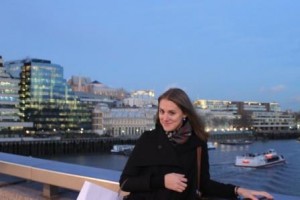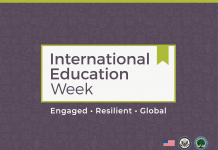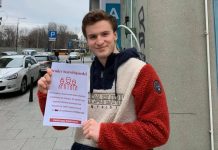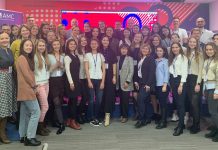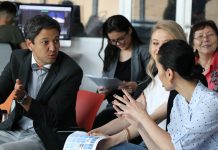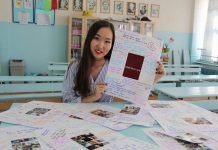Daria Karaulova ’09
Zarya, Russia/New Castle, PA
January term 2012 in London, the city where dinners take place in pubs and current political issues become a funny British joke
One of the crucial distinctions of New York University in Abu Dhabi (NYUAD) from other liberal arts colleges is the focus on providing a truly global experience in learning. Our university gives us the tremendous opportunity to spend two semesters and two January terms (j-term is a three-week intensive course on a certain topic) abroad. New York University has study abroad sites all over the world, allowing students to enjoy sites as varied as the exotic Latin American experience in Buenos Aires or the beauty of the Italian architecture in Florence to the discovery of Asian wisdom in Shanghai or the natural beauty and energy of African dances in Ghana. Most of the study abroad sites include the additional mandatory language and cultural programs, designed to deepen one’s understanding of the new culture and take advantage of the opportunities that open up in front of the students as they are learning the language of their “host” country. This sounds like a miraculous dream but at NYUAD it’s possible, though not always easy. I’d explain it as being like four FLEX experiences of a much shorter time period and with higher expectations. These experiences also involve going through cultural shock, getting settled and accustomed to a new environment and society, as well as going through loads of frustration, excitement, ups and downs, expectations, surprises, meeting new friends establishing connections and finally finding a new home.
I was fortunate to spend this j-term in London, where I took the political science course ‘Politics in Modern Europe.’ The course covered three main topics: the European Union (EU) and its current crisis, modern political situation of Eastern Europe and the emergence of democracies in post communist countries, governmental structures and current events in Western European politics. The course was designed so that material usually given in a 14-week course was consolidated into three intensive weeks of lectures and fieldtrips. Three professors, each experts and authors in their fields, teamed up to teach the course. The first block on the politics of the EU was taught by famous British political scientist and current professor in the London School of Economics Simon Hix. We used his recent book “The Political System of the European Union”(2011). The main focus of Prof. Hix’s work is on the studies of the electoral systems design and voting in the European Parliament. He has also created a website that shows the voting results in the EU (votewatch.eu). The second block was taught by Professor Joshua Tucker from NYU New York, an expert in Eastern European politics with a focus on former Soviet Union countries, and a writer of the popular political blog themonkeycage.org. Prof. Tucker has spent the major part of his career studying electoral systems in post communist European countries with a focus on Poland and Russia. The main resource for his lectures was his book “Regional Economic Voting: Russia, Poland, Hungary, Slovakia and Czech Republic, 1990-1999”(2006), which analyzes studies of the “regional economic voting” during the transition from communism to democracy based on the comparison of statistics from the elections in specific former Soviet countries. The last block of the course on Western Europe was taught by Michael Laver, chair of the Department of Politics, NYU New York, whose lectures were mainly based on his book “Representative Government in Modern Europe”(2011). His book offers logical and very clear insights into the governmental structures of Western European countries. At first it might seem that this is a wide range of information for such a short period of time, but Prof. Laver succeeded at designing this course conceptually so that each topic played off of the others and allowed us develop a sophisticated picture of the current political and economic situation in European politics. The proof of this success was obvious when all three of the Professors held an interesting debate on the hot topic: “Will Europe survive the euro?” which was followed by the lively discussion with NYUAD students.
In addition to morning lectures, we were also offered afternoon activities such as the visit to the European Parliament, lectures by guest speakers from the European Parliament, as well as the Bosnian Ambassador in UK, and visits to other local governmental organizations, a public opinion company, and even to the floor of the House of Lords and the House of Commons for British Parliamentary debates.
While our days were full, we still explored the city and the area around it by walking around the Center of London with its main attractions such as Big Ben, the Parliament, Westminster Abbey, Trafalgar Square, Hyde Park, Buckingham Palace and others, visiting the Winston Churchill War Rooms exhibition, going on a weekend trip to Cambridge as well as watching a local football match (Charlton vs. Fulham), which gave us good insight into the British football culture. We realized that football definitely is a big part of the lives of British people of all ages. Everyone from the children to the elders were out there cheering on their teams and showing pride in their football clubs. Incredible!
For me, a person who is majoring in political science and loves traveling and experiencing new cultures, this January term has been a very useful and intellectually rich experience. It gave me an opportunity to study an area of political science in which I am especially interested, and has motivated me to incorporate the knowledge I gained in this course in my future capstone project (known as senior final project in other colleges). London impressed me as a very culturally centered and yet quite cosmopolitan and welcoming city. It has found a very creative and quite natural way of joining together its historical pride and modern innovations. And if anyone ever tells you that London is a city that goes dark early and has parties that die out before they start, never believe them. London never sleeps and I have witnessed it through my own, increasingly multicultural eyes.

